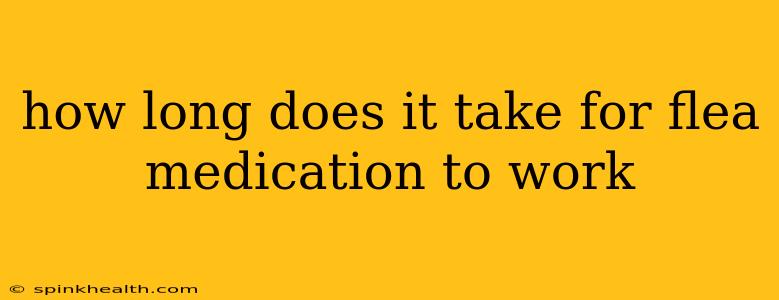How Long Does It Take for Flea Medication to Work? A Comprehensive Guide
The age-old battle against fleas is a frustrating one for many pet owners. Imagine this: you've just applied that expensive flea medication, expecting immediate results, only to find your furry friend still scratching hours later. The truth is, there's no magic bullet—the time it takes for flea medication to work varies significantly depending on several factors. Let's unravel this mystery together, exploring the different types of treatments and their effectiveness timelines.
Understanding the Different Types of Flea Medication
Before diving into timelines, it's crucial to understand that flea medications aren't all created equal. They work through different mechanisms, impacting the flea life cycle at various stages. Broadly, we can categorize them as:
- Topical Treatments: These are applied directly to your pet's skin, usually in the form of a spot-on solution. They work by absorbing into the bloodstream and killing fleas that bite your pet.
- Oral Medications: These are given as pills or chewables and are also absorbed into the bloodstream. They often have a broader range of effects, targeting not just adult fleas but also larvae and eggs.
- Flea Collars: These collars release insecticides slowly over time, providing continuous protection. The effectiveness varies depending on the brand and quality.
How Long Until You See Results? A Breakdown by Medication Type
Now, let's tackle the crucial question: how long does it take?
How long does it take for topical flea medication to work?
Most topical medications start working within 24-48 hours. You'll likely see a reduction in flea activity within this timeframe. However, complete elimination of the flea infestation might take a few days or even a week, especially if the infestation is severe. Remember that topical treatments primarily target adult fleas, so existing eggs and larvae will still need to hatch and be exposed to the medication.
How long does it take for oral flea medication to work?
Oral medications generally take a little longer to become fully effective, often within a few days to a week. This is because they need to be absorbed and distributed throughout the body. The benefit here is often a broader effect, targeting the entire flea life cycle.
How long does it take for flea collars to work?
Flea collars provide continuous protection but may take several days to a week to reach their full effectiveness. This is because the insecticide needs to gradually saturate the collar and be released into your pet's fur.
What if my pet is still scratching after a week?
If your pet is still showing signs of flea infestation after a week, several things might be at play:
- Severity of the Infestation: A heavy infestation might require more time to clear. Consider repeating the treatment as directed on the product label.
- Incorrect Application: Make sure you’re following the instructions precisely. Improper application can significantly reduce effectiveness.
- Medication Type Mismatch: The chosen treatment might not be suitable for your pet's age, breed, or the severity of the infestation.
- Environmental Factors: Your home environment might still harbor flea eggs and larvae. Thorough cleaning and treatment of your home is crucial for complete eradication.
Additional Factors Affecting Treatment Time
- Your Pet's Metabolism: How quickly your pet's body processes the medication influences the speed of effect.
- The Flea's Resistance: Some fleas have developed resistance to certain insecticides.
- Environmental Conditions: High humidity and temperatures can affect the medication's effectiveness.
Remember, always consult your veterinarian before using any flea medication on your pet. They can help you choose the best treatment based on your pet's individual needs and the severity of the infestation. A proactive approach that includes regular preventative treatments is key to preventing future flea problems. Your veterinarian can advise on the best ongoing preventative strategy for your pet and your home.

